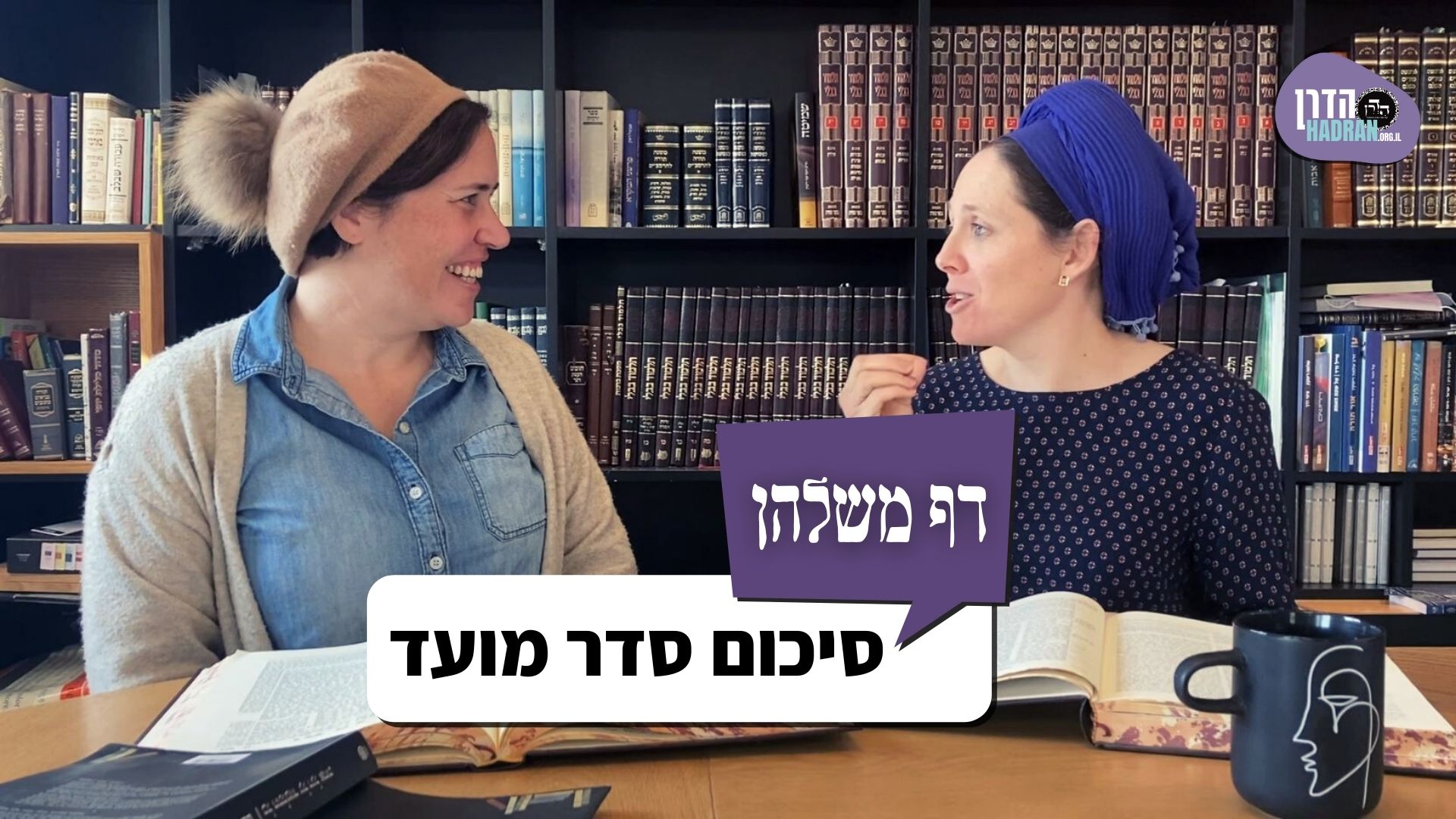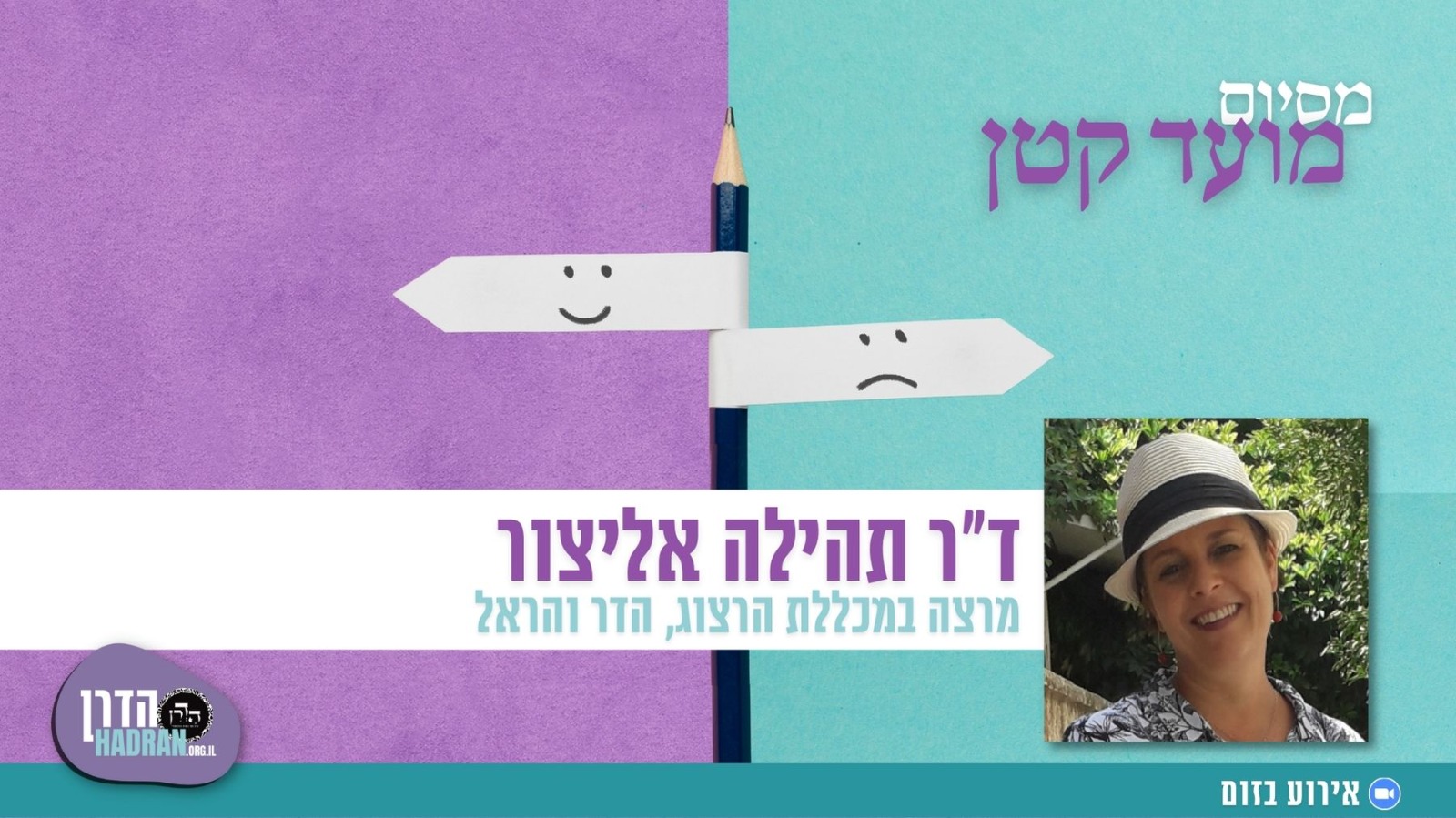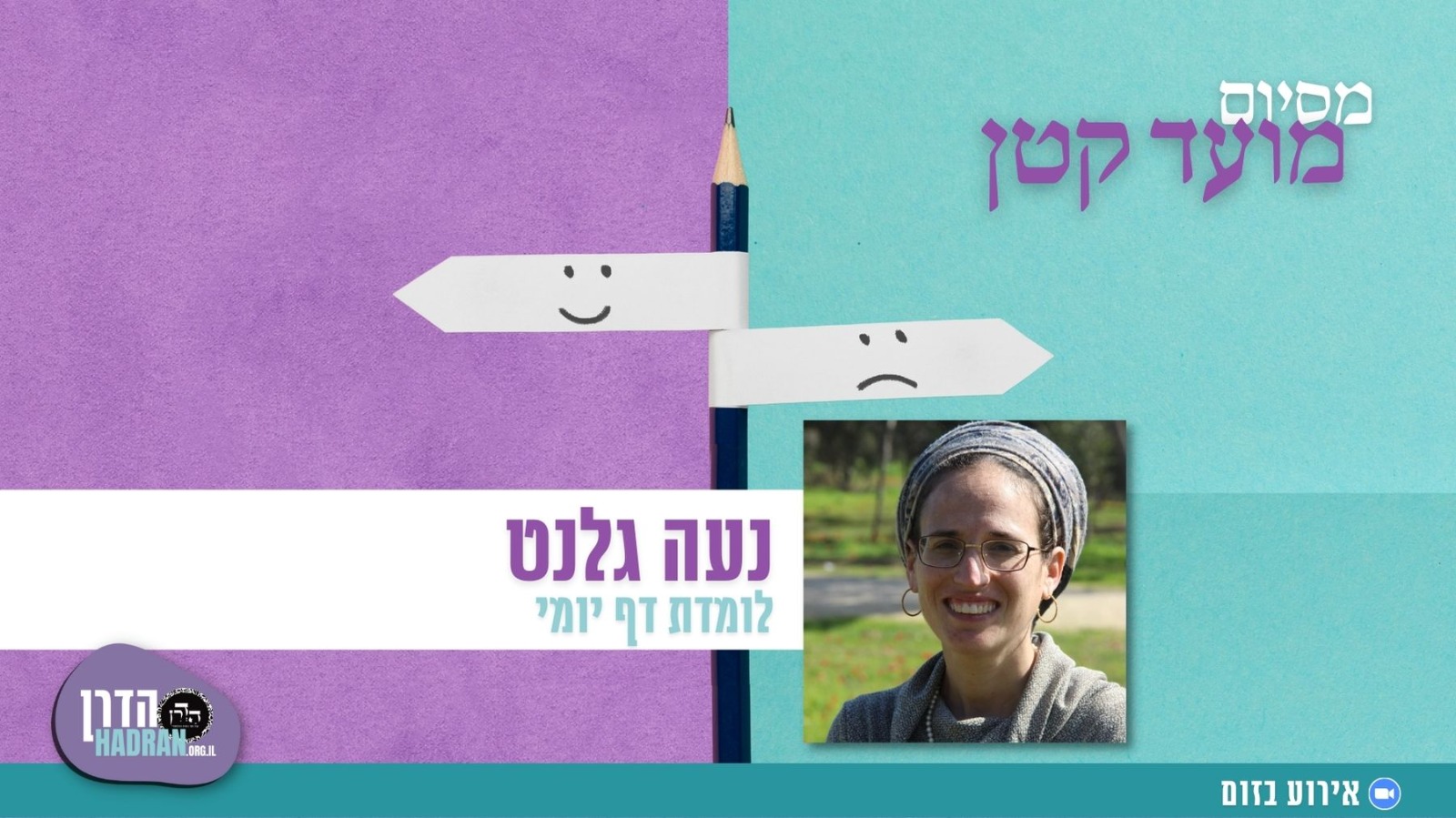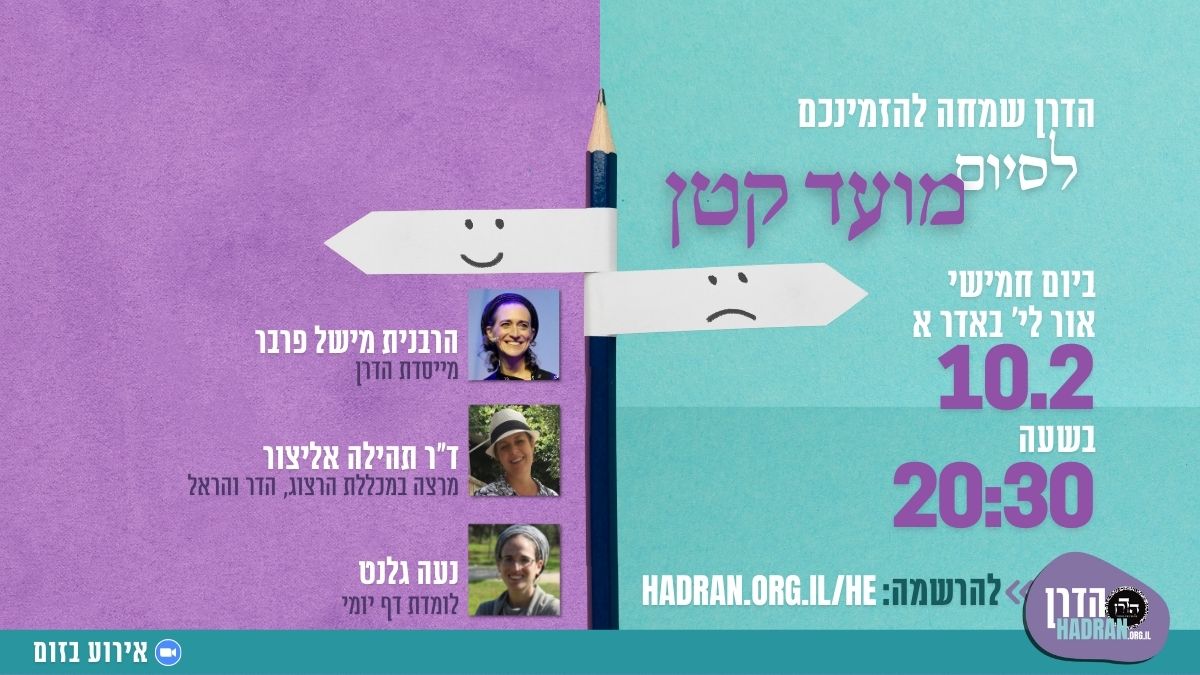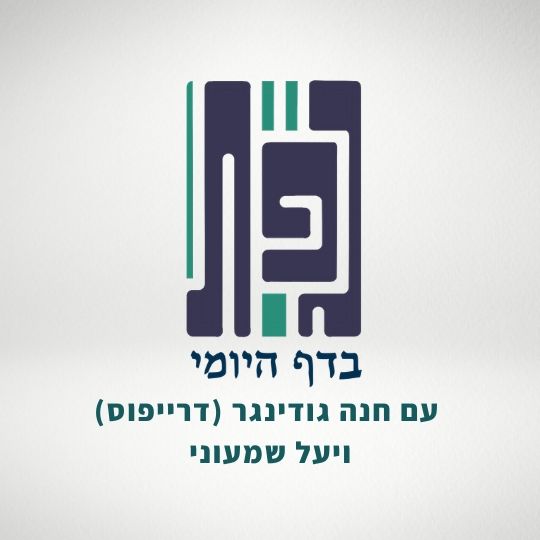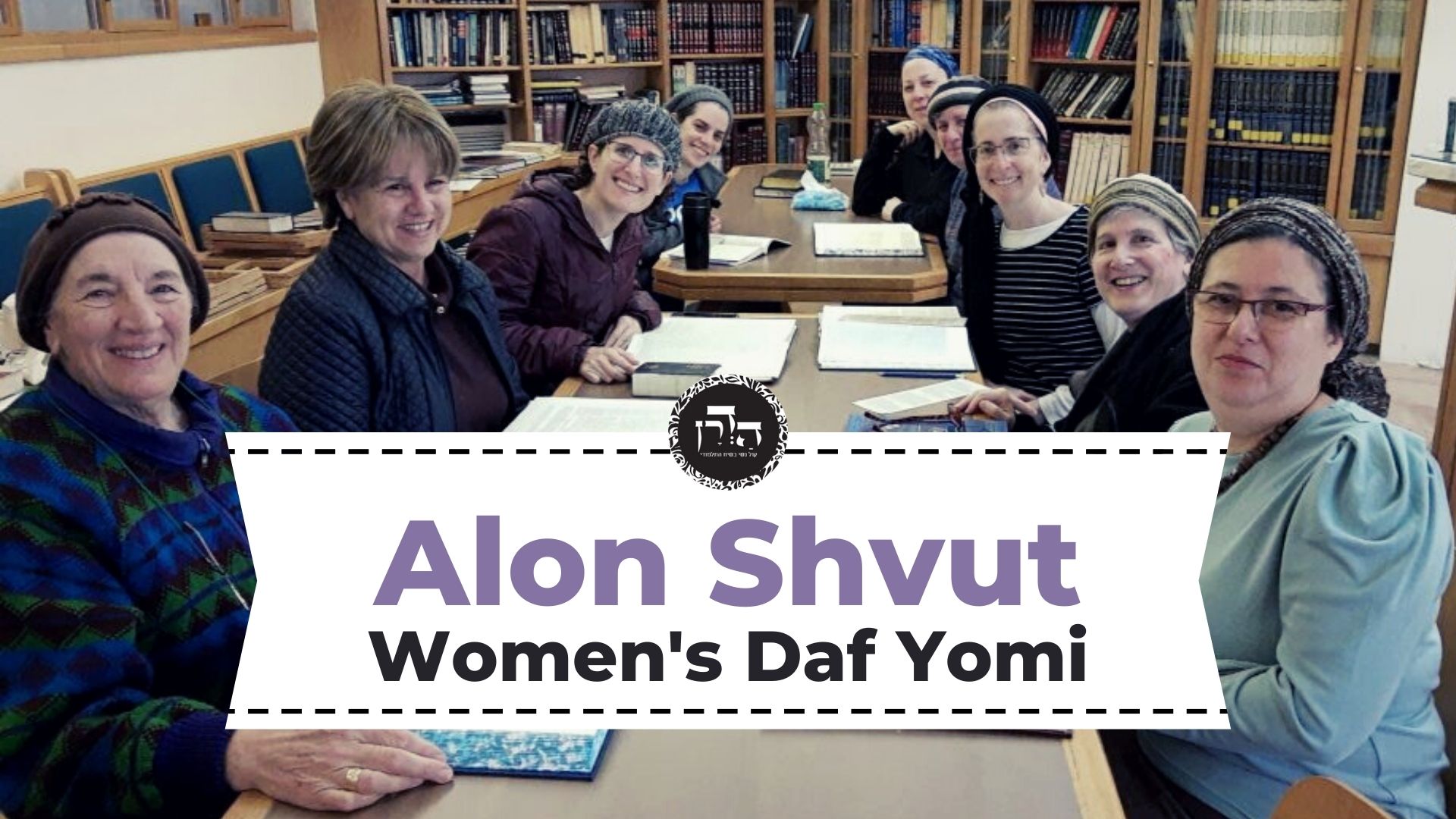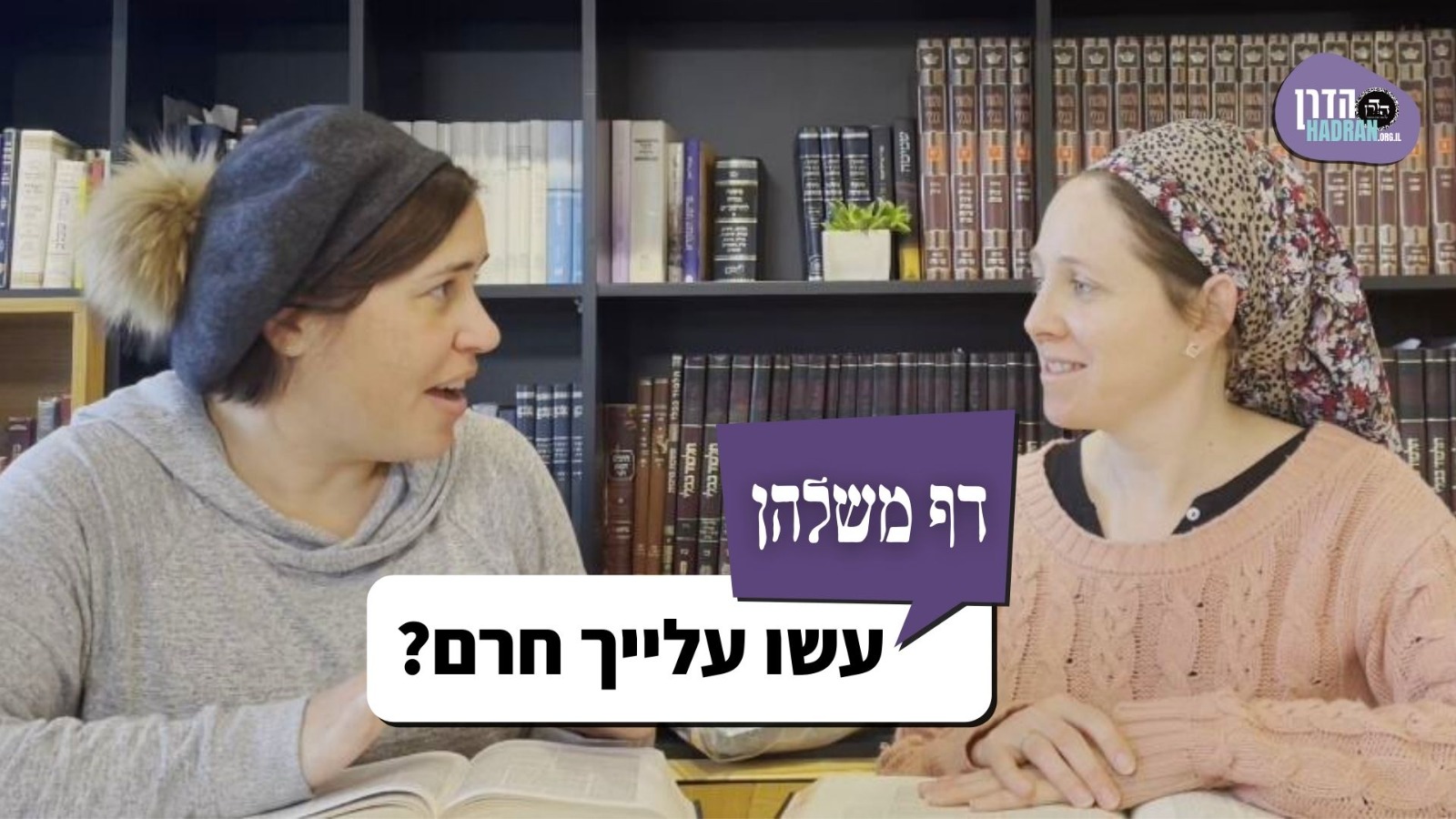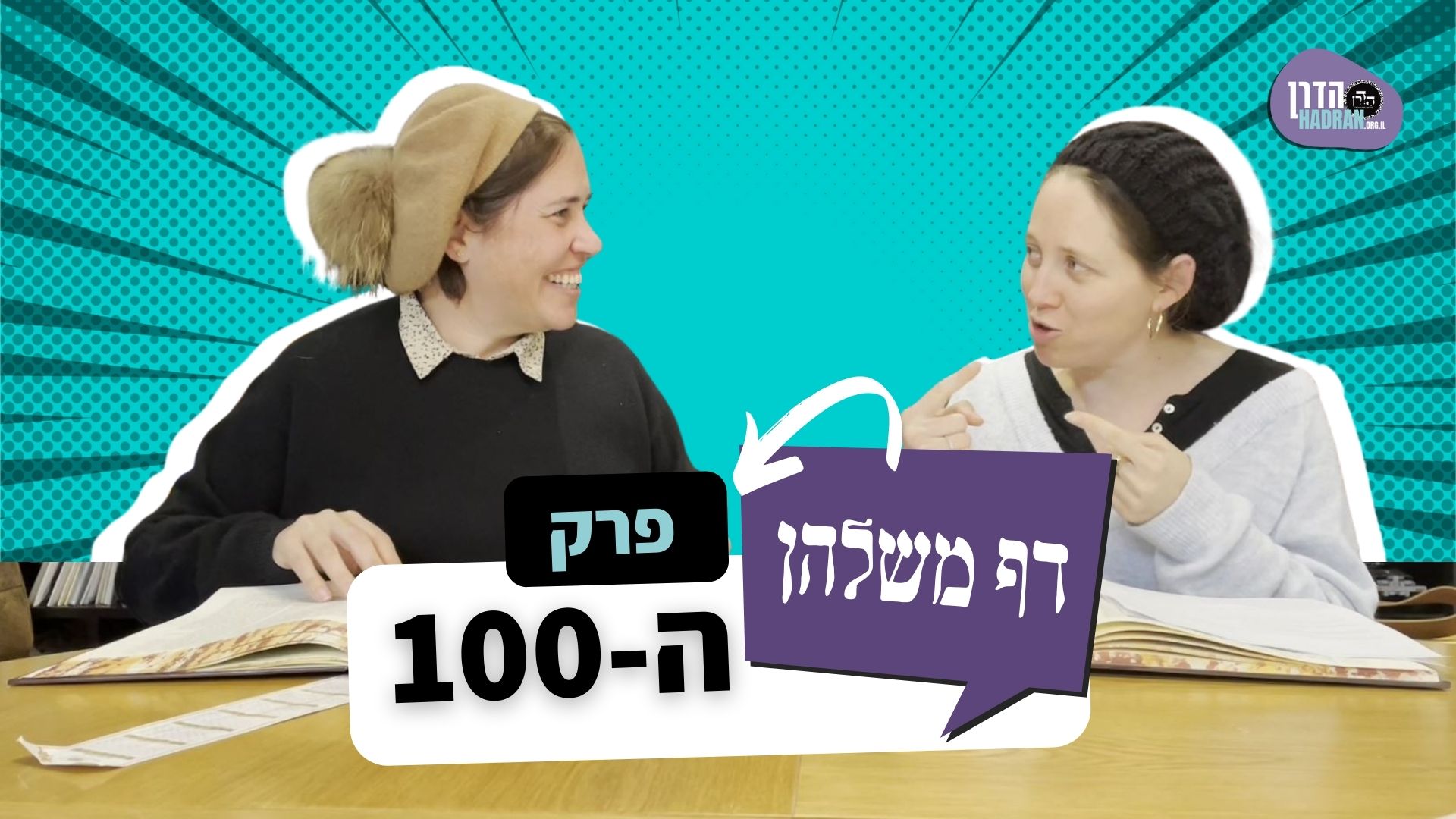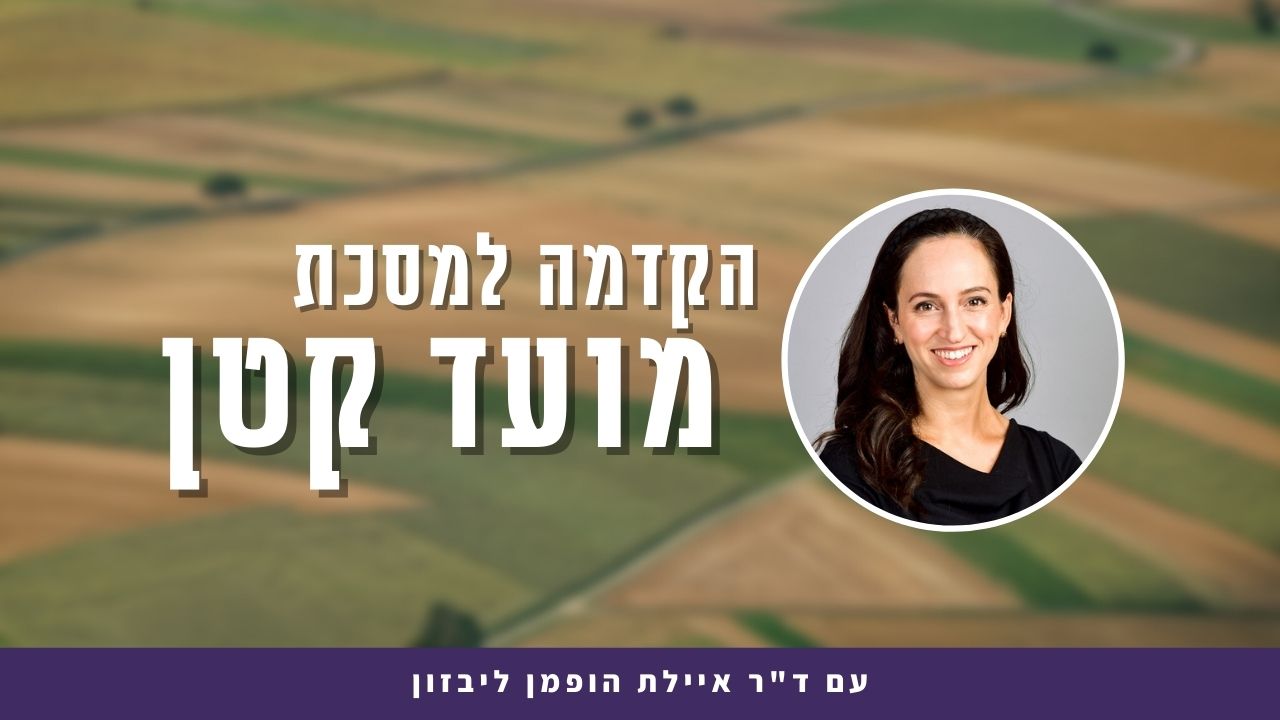מועד קטן י
הַהֶדְיוֹט תּוֹפֵר כְּדַרְכּוֹ. הֵיכִי דָּמֵי הֶדְיוֹט? אָמְרִי דְּבֵי רַבִּי יַנַּאי: כֹּל שֶׁאֵינוֹ יָכוֹל לְהוֹצִיא מְלֹא מַחַט בְּבַת אַחַת. רַבִּי יוֹסֵי בַּר חֲנִינָא אָמַר: כֹּל שֶׁאֵינוֹ יָכוֹל לְכַוֵּין אִימְרָא בְּחֵפֶת חֲלוּקוֹ.
§ It was taught in the mishna: A layman, who is not a skilled tailor, may sew in his usual manner on the intermediate days of a Festival. The Gemara asks: What are the circumstances in which an individual is considered a layman? The Sages of the school of Rabbi Yannai said: Anyone who cannot deftly pull a full needle of stiches through the fabric at the same time is considered a layman. Rabbi Yosei bar Ḥanina said: Anyone who cannot form a straight seam on the hem [ḥefet] of his shirt is considered a layman.
וְהָאוּמָּן מַכְלִיב. מַאי מַכְלִיב? רַבִּי יוֹחָנָן אָמַר: מַפְסִיעַ. רַבָּה בַּר שְׁמוּאֵל אֲמַר: שִׁינֵּי כַלְבְּתָא.
§ It was further taught in the mishna: A craftsman, however, may form only temporary stitches [makhliv]. The Gemara asks: What is meant by forming temporary stitches? Rabbi Yoḥanan said: He does not sew all the stitches that are necessary, but rather he skips certain stitches in the middle (Rabbeinu Hananel). Rabba bar Shmuel said: He sews stitches that are like the teeth of a dog. He does not sew all the stitches in a straight line, so that they resemble the teeth of a dog, which also are not straight.
מְסָרְגִין אֶת הַמִּטּוֹת. מַאי ״מְסָרְגִין״ וּמַאי ״מְמַתְּחִין״? כִּי אֲתָא רַב דִּימִי אָמַר: פְּלִיגִי בַּהּ רַבִּי חִיָּיא בַּר אַבָּא וְרַבִּי אַסִּי, וְתַרְוַיְיהוּ מִשְּׁמֵיהּ דְּחִזְקִיָּה וְרַבִּי יוֹחָנָן חַד אָמַר: מְסָרְגִין — שְׁתִי וָעֵרֶב, וּמְמַתְּחִין — שְׁתִי בְּלֹא עֵרֶב. וְחַד אָמַר: מְסָרְגִין — שְׁתִי בְּלֹא עֵרֶב, וּמְמַתְּחִין — שֶׁאִם הָיָה רָפוּי, מְמַתְּחוֹ.
§ It was also taught in the mishna: One may interweave the cords attached to the frame of a bed. Rabbi Yosei says: One may only tighten the cords. The Gemara asks: What is meant by interweaving, and what is meant by tightening? When Rav Dimi came from Eretz Yisrael to Babylonia, he said: Rabbi Ḥiyya bar Abba and Rabbi Asi disagree about the matter, and both of them reported their opinions in the name of Ḥizkiyya and Rabbi Yoḥanan. One Sage said: Interweaving involves placing and tying the cords of the bed both lengthwise and widthwise, whereas tightening means arranging the cords only lengthwise and not widthwise. And one Sage said: Interweaving involves arranging the cords only lengthwise and not widthwise, while tightening means that if a cord became loose, he may tighten it but he may not tie any new cords.
אִינִי? וְהָא תָּנֵי רַב תַּחְלִיפָא בַּר שָׁאוּל: וְשָׁוִין שֶׁאֵין מַפְשִׁילִין חֲבָלִים לְכַתְּחִלָּה. בִּשְׁלָמָא לְמַאן דְּאָמַר מְסָרְגִין — שְׁתִי וָעֵרֶב, וּמְמַתְּחִין — שְׁתִי בְּלֹא עֵרֶב, הַיְינוּ דְּקָתָנֵי רַב תַּחְלִיפָא בַּר שָׁאוּל: וְשָׁוִין שֶׁאֵין מַפְשִׁילִין חֲבָלִים לְכַתְּחִלָּה.
The Gemara asks: Is that so? Didn’t Rav Taḥlifa bar Shaul teach the following baraita: And both Rabbi Meir and Rabbi Yosei agree that one may not braid cords anew on the intermediate days of a Festival? Granted, according to the one who said that interweaving means tying the cords lengthwise and widthwise, and tightening means tying them only lengthwise and not widthwise, this explanation is consistent with that which Rav Taḥlifa taught: And they both agree that one may not braid cords anew, as even though one is permitted to arrange the cords of the bed, he is not permitted to produce new cords.
אֶלָּא לְמַאן דְּאָמַר מְסָרְגִין — שְׁתִי בְּלֹא עֵרֶב, מְמַתְּחִין — שֶׁאִם הָיָה רָפוּי הָיָה מְמַתְּחוֹ. הַשְׁתָּא שְׁתִי וָעֵרֶב אָמְרַתְּ לָא — חֲבָלִים לְכַתְּחִלָּה מִיבַּעְיָא?! קַשְׁיָא.
However, according to the one who said that interweaving means tying the cords only lengthwise and not widthwise, while tightening means that if a cord became loose, he may tighten it, there is a difficulty. Now that you said that tying the cords lengthwise and widthwise, no, it is not permitted even though the cords are readily available, is it necessary to say that braiding cords anew is prohibited? The Gemara comments: Indeed it is difficult.
אֲמַר לֵיהּ רַב נַחְמָן בַּר יִצְחָק לְרַבִּי חִיָּיא בַּר אָבִין: מִי אִיכָּא לְמַאן דְּאָמַר מְסָרְגִין — שְׁתִי בְּלֹא עֵרֶב? וְהָתְנַן, רַבִּי מֵאִיר אוֹמֵר: הַמִּטָּה מִשֶּׁיְּסָרֵג בָּהּ שְׁלֹשָׁה בָּתִּים!
Rav Naḥman bar Yitzḥak said to Rabbi Ḥiyya bar Avin: Is there one who says that interweaving means tying the cords lengthwise, but not widthwise? Didn’t we learn in a mishna (Kelim 16:1) that Rabbi Meir says: A bed is considered a utensil and becomes susceptible to ritual impurity from when one interweaves three rows of meshes in it, i.e., three rows lengthwise and widthwise? It is clear from here that interweaving a bed involves tying its cords lengthwise and widthwise.
אֶלָּא, כִּי אֲתָא רָבִין אָמַר: בִּמְסָרְגִין כּוּלֵּי עָלְמָא לָא פְּלִיגִי דִּשְׁתִי וָעֵרֶב, אֶלָּא כִּי פְּלִיגִי בִּמְמַתְּחִין. מָר סָבַר מְמַתְּחִין — שְׁתִי בְּלֹא עֵרֶב, וּמָר סָבַר: שֶׁאִם הָיָה רָפוּי מְמַתְּחוֹ.
Rather, when Ravin came from Eretz Yisrael to Babylonia he stated a different version of the tradition: With regard to interweaving, everyone agrees that it is referring to tying the cords of a bed lengthwise and widthwise. When they disagree it is only about the meaning of tightening. One Sage holds that tightening means arranging the cords only lengthwise and not widthwise. And one Sage holds that it means that if a cord became loose, he may tighten it.
מֵיתִיבִי: מְסָרְגִין אֶת הַמִּטָּה, וְאֵין צָרִיךְ לוֹמַר שֶׁמְּמַתְּחִין, דִּבְרֵי רַבִּי מֵאִיר. רַבִּי יוֹסֵי אוֹמֵר: מְמַתְּחִין, אֲבָל לֹא מְסָרְגִין. וְיֵשׁ אוֹמְרִים: אֵין מְמַתְּחִין כׇּל עִיקָּר.
The Gemara raises an objection from the following baraita: One may interweave the cords attached to the frame of a bed on the intermediate days of a Festival, and needless to say one may tighten those cords; this is the statement of Rabbi Meir. Rabbi Yosei says: One may only tighten the ropes but not interweave them. And some say: One may not tighten them at all.
בִּשְׁלָמָא לְמַאן דְּאָמַר מְמַתְּחִין שְׁתִי בְּלֹא עֵרֶב, הַיְינוּ דְּאָתוּ יֵשׁ אוֹמְרִים לְאִיפְּלוֹגֵי. אֶלָּא לְמַאן דְּאָמַר שֶׁאִם הָיָה רָפוּי מְמַתְּחוֹ, לְיֵשׁ אוֹמְרִים מְמַתְּחוֹ נָמֵי לָא?
Granted, according to the one who said that tightening means tying the cords only lengthwise and not widthwise, this is why the opinion presented as: Some say, comes to disagree and says that one may not tie the cords at all, even only lengthwise. However, if the cords became loose, all agree that they may be tightened. But according to the one who said that tightening means that if a cord became loose he may tighten it, then according to the opinion presented here as: Some say, may he not even tighten the cords of his bed? How, then, would he be able to sleep on it?
אִין, כֵּיוָן דְּאֶפְשָׁר לְמִמְלְיֵיהּ בְּמָאנֵי — לָא טָרְחִינַן.
The Gemara answers: Yes, indeed, according to this opinion, it is prohibited even to tighten the cords of one’s bed. Since it is possible for him to fill the depression in his bed with clothing, so that he can sleep there, he may not exert himself during the week of the Festival and fix the bed in a more permanent manner.
מַתְנִי׳ מַעֲמִידִין תַּנּוּר וְכִירַיִם וְרֵיחַיִם בַּמּוֹעֵד. רַבִּי יְהוּדָה אוֹמֵר: אֵין מְכַבְּשִׁין אֶת הָרֵיחַיִם בַּתְּחִילָּה.
MISHNA: One may set up an oven, a stove, and a mill on the intermediate days of a Festival. Rabbi Yehuda says: One may not chisel millstones for the first time on the intermediate days of a Festival.
גְּמָ׳ מַאי מְכַבְּשִׁין? רַב יְהוּדָה אָמַר: מְנַקַּר רִיחְיָא. רַב יְחִיאֵל אָמַר: בַּת עֵינָא.
GEMARA: The Gemara asks: What is meant by chiseling millstones? Rav Yehuda said: Cutting grooves into the millstones. As the millstones wear down over time and become smooth, one must occasionally cut grooves into the stones so that they can grind properly. Rav Yeḥiel said: Cutting out an eyehole in the upper millstone, through which the grain can pass, so that it can be ground between the two millstones.
מֵיתִיבִי: מַעֲמִידִין תַּנּוּר וְכִירַיִם בַּמּוֹעֵד, וּבִלְבַד שֶׁלֹּא יִגְמוֹר מְלַאכְתָּן, דִּבְרֵי רַבִּי אֱלִיעֶזֶר. וַחֲכָמִים אוֹמְרִים: אַף יִגְמוֹר. רַבִּי יְהוּדָה אוֹמֵר מִשְּׁמוֹ: מַעֲמִידִין אֶת הַחֲדָשָׁה, וּמְכַבְּשִׁין אֶת הַיְּשָׁנָה. וְיֵשׁ אוֹמְרִים: אֵין מְכַבְּשִׁין כׇּל עִיקָּר.
The Gemara raises an objection from a baraita: One may set up an oven and a stove on the intermediate days of a Festival, provided that he does not fully complete the labor; this is the statement of Rabbi Eliezer. But the Rabbis say: He may even complete the labor. Rabbi Yehuda says in the name of Rabbi Eliezer: One may set up a new millstone and one may chisel an old millstone. And some say: One may not chisel a millstone at all.
בִּשְׁלָמָא לְמַאן דְּאָמַר מְכַבְּשִׁין מְנַקַּר רִיחְיָא — הַיְינוּ דְּמַשְׁכַּחַתְּ לַהּ בִּישָׁנָה, אֶלָּא לְמַאן דְּאָמַר בַּת עֵינָא יְשָׁנָה — בַּת עֵינָא לְמָה לַהּ? כְּגוֹן דְּקָא בָּעֵי לְאַרְווֹחֵי טְפֵי פּוּרְתָּא.
Granted, according to the one who said that chiseling a millstone means cutting grooves into the millstones, this is how you can find this activity relevant to an old mill. But according to the one who said it means cutting out an eyehole, why does an old millstone need an eyehole to be cut out? It must have one already. The Gemara answers: This is referring to a case where he wants to widen the hole a little more.
רַב הוּנָא שַׁמְעֵיהּ לְהָהוּא גַּבְרָא דְּקָא מְנַקַּר רִיחְיָא בְּחוּלָּא דְמוֹעֲדָא, אֲמַר: מַאן הַאי? אִיתַּחִיל גּוּפֵיהּ דְּקָא מַחֵיל חוּלָּא דְּמוֹעֲדָא. סָבַר לַהּ כְּיֵשׁ אוֹמְרִים.
The Gemara relates that Rav Huna once heard a certain man cutting grooves into his millstone on the intermediate days of a Festival. He said: Who is this? May his body be desecrated, for he desecrates the intermediate days of a Festival. The Gemara comments: Rav Huna holds in accordance with the statement cited as: Some say, that one is not permitted to roughen his millstones at all.
דָּרֵשׁ רַב חָמָא: נוֹקְרִין רֵיחַיִם בַּמּוֹעֵד. מִשּׁוּם רַבִּי מֵאִיר אָמַר: אֲפִילּוּ סוּס שֶׁרוֹכֵב עָלָיו וַחֲמוֹר שֶׁרוֹכֵב עָלָיו — מוּתָּר לִיטּוֹל צִפׇּרְנַיִם בְּחוּלּוֹ שֶׁל מוֹעֵד,
Rav Ḥama taught as follows: One may cut grooves into millstones on the intermediate days of a Festival. In the name of Rabbi Meir he said: Even with regard to the horse that one rides upon and the donkey that he rides upon, he is permitted to trim their hooves on the intermediate days of a Festival so that they do not suffer when they walk.
אֲבָל חֲמָרָא דְרִיחְיָא — לָא.
However, with regard to the hooves of a donkey that turns the millstones, no, they may not be trimmed. This is unnecessary on the intermediate days of a Festival, as one may only grind grain that one needs to use on the Festival itself, and the donkey can perform this task even if its hooves are not trimmed.
רַב יְהוּדָה שְׁרֵי לְמִישְׁקַל טוּפְרֵיהּ לַחֲמָרָא דְרִיחְיָא, וּלְאוֹקוֹמֵי רִיחְיָא, וּלְמִיבְנֵי רִיחְיָא, וּלְמִיבְנֵי אַמַּת רִיחְיָא, וּלְמִיבְנֵי אוּרְיָא. רָבָא שְׁרָא לְסָרוֹקֵי סוּסְיָא, וּלְמִיבְנֵי אַקְרָפִיטָא, וּלְמִיבְנֵי אִיצְטְבָא.
Rav Yehuda permits one to trim the hooves of the donkey that turns a mill, to set the stones of a mill in their place, to build the base of a mill, to construct a water channel to carry water that drives a mill, and to build a stable for horses on the intermediate days of a Festival. Rava permitted one to groom a horse, to build a trough, and to build a bench on the intermediate days of a Festival.
רָבָא שְׁרָא לְמִישְׁקַל דְּמָא לִבְהֵמָה בְּחוּלָּא דְּמוֹעֲדָא. אֲמַר לֵיהּ אַבָּיֵי, תַּנְיָא דִּמְסַיַּיע לָךְ: מַקִּיזִין דָּם לַבְּהֵמָה, וְאֵין מוֹנְעִין רְפוּאָה לַבְּהֵמָה בְּחוּלּוֹ שֶׁל מוֹעֵד.
Rava also permitted one to let the blood of an animal for medical purposes on the intermediate days of a Festival. Abaye said to him: A baraita is taught that supports you: One may let blood from an animal, and one does not withhold any medical treatment from an animal on the intermediate days of a Festival.
רָבָא שְׁרָא לְכַסְכּוֹסֵי קִירְמֵי. מַאי טַעְמָא — מַעֲשֵׂה הֶדְיוֹט הוּא. אָמַר רַב יִצְחָק בַּר אַמֵּי אֲמַר רַב חִסְדָּא: קִיטּוּרֵי בֵירֵי — אֲסִיר. מַאי טַעְמָא — מַעֲשֵׂה אוּמָּן הוּא.
Rava further permitted one to scrub garments as part of the laundry process. What is the reason? It is the work of a layman and not the work of a craftsman, which is prohibited on the intermediate days of a Festival. Rav Yitzḥak bar Ami said that Rav Ḥisda said: Tying sleeves to create pleats is prohibited. What is the reason? It is the work of a craftsman and is consequently prohibited on the intermediate days of a Festival.
אָמַר רָבָא: מַאן דִּמְתַקֵּיל אַרְעָא אַדַּעְתָּא דְּבֵי דָרֵי — שְׁרֵי, אַדַּעְתָּא דְאַרְעָא — אֲסִיר.
§ Rava said: With regard to one who clears the ground on the intermediate days of a Festival, the following distinction applies: If his intention is to prepare a threshing floor, it is permitted, but if his intention is to prepare the ground for planting, it is prohibited.
הֵיכִי דָּמֵי? — מוּלְיָא בְּמוּלְיָא וְנַצָּא בְּנַצָּא — אַדַּעְתָּא דְבֵי דָרֵי, שְׁקַל מוּלְיָא וּשְׁדָא בְּנַצָּא — אַדַּעְתָּא דְאַרְעָא.
The Gemara asks: What are the circumstances of each case? The Gemara explains: If he casts earth from one mound [mulya] onto another mound, or from one furrow into another furrow [natza], it is clear that he is doing this with the intention of preparing a threshing floor, as his sole interest is the level area in the middle and not the ground that surrounds it. However, if he takes earth from a mound and casts it into a furrow, he is presumably doing this with the intention of preparing the ground for planting, which is prohibited on the intermediate days of a Festival due to its similarity to the prohibited labor of plowing.
וְאָמַר רָבָא: הַאי מַאן דְּזָכֵי זִיכֵי, אַדַּעְתָּא דְצִיבֵי — שְׁרֵי, אַדַּעְתָּא דְאַרְעָא — אֲסִיר. הֵיכִי דָּמֵי? שָׁקֵיל רַבְרְבֵי וְשָׁבֵיק זוּטְרֵי — אַדַּעְתָּא דְצִיבֵי, שְׁקַל רַבְרְבֵי וְזוּטְרֵי — אַדַּעְתָּא דְאַרְעָא.
And Rava said: With regard to one who clears his field from twigs on the intermediate days of a Festival, the following distinction applies: If his intention is to use the twigs it is permitted, but if his intention is to prepare the ground for planting, it is prohibited. The Gemara asks: What are the circumstances of each case? The Gemara explains: If he takes the large twigs and leaves the small ones, it is clear that he is doing this with the intention of using the twigs. But if he takes both the large twigs and the small ones, it appears as though that he is doing so with the intention of preparing the ground, and it is prohibited.
וְאָמַר רָבָא: הַאי מַאן דְּפָתַח מַיָּא לְאַרְעֵיהּ, אַדַּעְתָּא דִכְווֹרֵי — שְׁרֵי, אַדַּעְתָּא דְאַרְעָא — אֲסִיר.
And Rava further said: With regard to one who opens the gates of a water channel running through his land on the intermediate days of a Festival, the following distinction applies: If his intention is to catch the fish that come along with the water, it is permitted, but if his intention is to water the ground, it is prohibited.
הֵיכִי דָּמֵי? פָּתַח תְּרֵי בָבֵי, חַד מֵעִילַּאי וְחַד מִתַּתַּאי — אַדַּעְתָּא דִכְווֹרֵי, פְּתַח חַד בָּבָא — אַדַּעְתָּא דְאַרְעָא.
The Gemara asks: What are the circumstances of each case? The Gemara explains: If he opens two gates in the water channel, one above his field and one below, so the water that flows in also flows out, it is clear that he is doing this with the intention of catching fish, as the water will flow out and only the fish will remain in the indentations in his field. But if he opens only one gate, he is presumably doing this with the intention of watering the ground, as it is evident that he wants the channel to fill and the water to overflow into the field.
וְאָמַר רָבָא: הַאי מַאן דְּפָשַׁח דִּיקְלָא, אַדַּעְתָּא דְחֵיוָתָא — שְׁרֵי, אַדַּעְתָּא דְּדִיקְלָא — אֲסִיר. הֵיכִי דָּמֵי? שָׁקֵיל כּוּלֵּיהּ מֵחַד גִּיסָא — אַדַּעְתָּא דְחֵיוָתָא, מֵהַאי גִּיסָא וּמֵהַאי גִּיסָא — אַדַּעְתָּא דְּדִיקְלָא וַאֲסִיר.
And Rava also said: With regard to one who cuts the branches of his date palm on the intermediate days of a Festival, the following distinction applies: If he does this with the intention of feeding his animals, it is permitted, but if he does it with the intention of enhancing the growth of his date palm, it is prohibited. The Gemara asks: What are the circumstances of each case? The Gemara explains: If he takes all of the branches from one side of the tree, he is doing this with the intention of feeding the branches to his animals, as it is evident that he is not concerned with the damage to the date palm. However, if he takes the branches from this side of the tree and also from the other side, it appears as though he is doing so with the intention of enhancing the growth of the date palm, and it is prohibited.
וְאָמַר רָבָא: הָנֵי תַּמְרֵי תוּחְלָנִי, מִיגְזְרִינְהוּ — שְׁרֵי, מַיְיצִינְהוּ — אֲסִיר. רַב פָּפָּא אָמַר: כֵּיוָן דְּמַתְלְעִי — כִּפְרַקְמַטְיָא הָאָבֵד דָּמֵי, וְשָׁרֵי.
And Rava further said: With regard to these unripe dates, cutting them into pieces in order to render them fit for eating is permitted on the intermediate days of a Festival, but preserving them is prohibited, as they will not be ready for use until after the Festival. Rav Pappa said: Since they are likely to become infested with worms if they are not properly attended to, they are treated like merchandise that will be lost, and it is permitted to preserve them on the intermediate days of a Festival.
וְאָמַר רָבָא: פְּרַקְמַטְיָא כָּל שֶׁהוּא, אָסוּר. אָמַר רַבִּי יוֹסֵי בַּר אָבִין: וּבַדָּבָר הָאָבֵד — מוּתָּר. רָבִינָא הֲוָה לֵיהּ הָהוּא עִיסְקָא דַּהֲוָה מִזְדַּבַּן בְּשִׁיתָּא אַלְפֵי, שַׁהֲיֵיהּ לְזַבּוֹנֵיהּ בָּתַר חוּלָּא דְמוֹעֲדָא וְזַבְּנֵיהּ בִּתְרֵיסַר אַלְפֵי.
§ And Rava also said: Any commerce is prohibited on the intermediate days of a Festival. Rabbi Yosei bar Avin said: But with regard to a matter that, if left unattended, will result in significant loss, it is permitted. The Gemara relates that Ravina once had a joint business venture that could have been sold for six thousand dinars, but he delayed selling it until after the intermediate days of a Festival, and he sold it then for twelve thousand dinars.
רָבִינָא הֲוָה מַסֵּיק זוּזֵי בִּבְנֵי אַקְרָא דְשַׁנְוָאתָא, אֲתָא לְקַמֵּיהּ דְּרַב אָשֵׁי, אֲמַר לֵיהּ: מַהוּ לְמֵיזַל הָאִידָּנָא עֲלַיְיהוּ? אֲמַר לֵיהּ: כֵּיוָן דְּהָאִידָּנָא הוּא דְּמַשְׁכַּחַתְּ לְהוּ, בְּיוֹמֵי אַחֲרִינֵי לָא מַשְׁכַּחַתְּ לְהוּ — כִּפְרַקְמַטְיָא הָאָבֵד דָּמֵי, וְשָׁרֵי.
It is further related that Ravina had lent money to the residents of the fortress of Shanvata. He came before Rav Ashi and said to him: What is the halakha with regard to going to them now, on the intermediate days of the Festival, to collect my debt? Rav Ashi said to him: Since it is now that you will find them, whereas on other days you will not find them, as during the year these people would travel from place to place to earn their livelihood, this is treated like merchandise that will be lost, and it is therefore permitted.
תַּנְיָא נָמֵי גַּבֵּי עֲבוֹדָה זָרָה כִּי הַאי גַוְונָא: הוֹלְכִין
The Gemara adds: So too, it is taught in a baraita with regard to idol worship like this case: One may go

